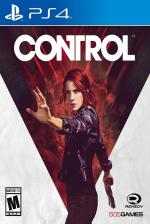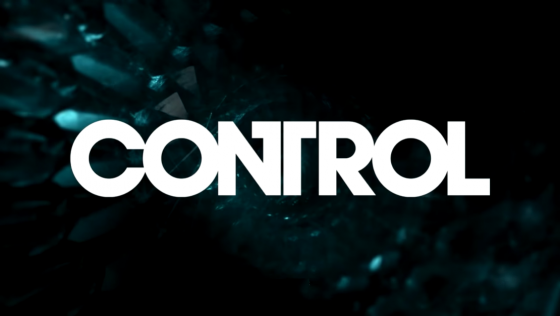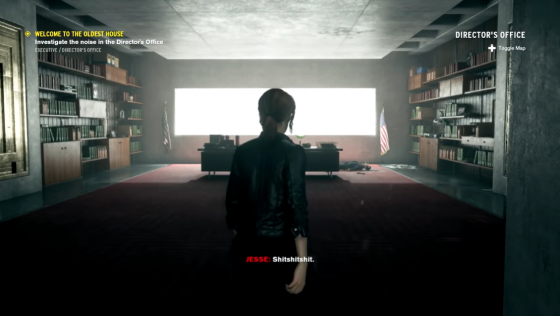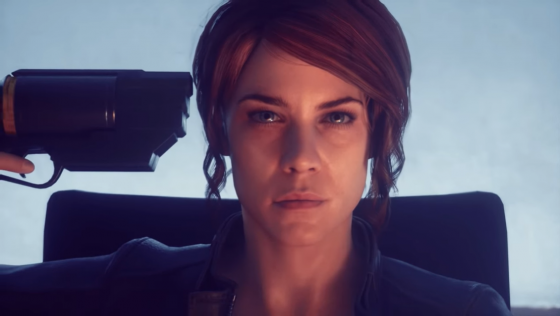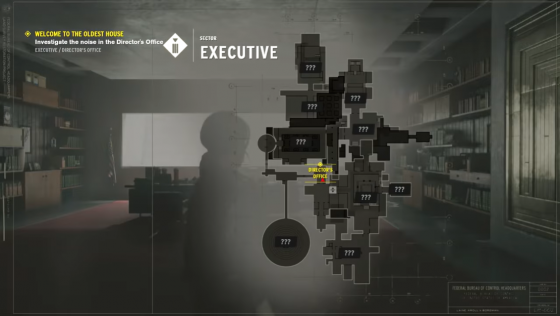Somewhere on the fringe of reality, lies the Federal Bureau of Control. Join them.
Control
Remedy Entertainment feels like a studio that's been searching for the right game for years. It's been rooting around the same space, third-person action adventure with a tinge of weirdness, action games probing the fabric of reality, revealing the secrets underneath. You can trace this line from Max Payne, to Alan Wake, Quantum Break and now Control.
In Control, you're Jesse Faden, a young woman who has spent years searching for the mythic Federal Bureau of Control. As a child, Jesse came in contact with an Altered Item, a strange object pulsing with powers from the dark sides of reality. The event destroyed her town, sent Jesse on the run, and saw the Bureau taking her brother Dylan into custody. As an adult, Jesse finds the Bureau again, hoping to free her brother. Unfortunately, she's shown up on the worst day possible, with the Bureau under attack from an unknown, invasion force.
In Max Payne, Remedy's signature oddness came from hallucinogenic trips related to the drug Valkyr. In Alan Wake and its sequel, Alan dealt with the Dark Presence, a supernatural force using his work to tear into our reality. Quantum Break was a side-step, leaning heavily into time-travel and the resulting loops and paradoxes it can cause. Control is a grab bag of everything, a little science, a little supernatural, a little bit of the dark gods seeking a place in the human world.
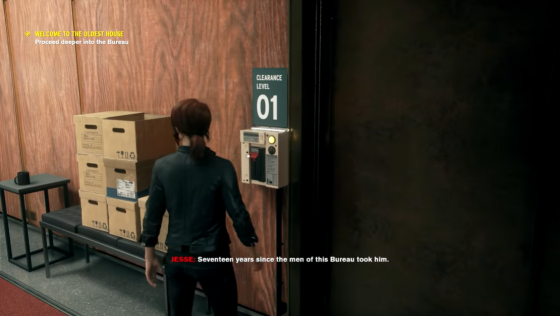
The entire game takes place in the Bureau's headquarters, the Oldest House, a building that can't be seen unless you're looking for it. It's larger on the inside than the outside, and the rooms within are constantly shifting, moving in and out of reality. Here, the Bureau studies the paranormal, and keeps the objects it collects from around the United States.
I confess, I'm a huge fan of the setting of Control. I very much enjoy fiction that centers around organizations combating the unknown, like Men in Black, Fringe, Warehouse 13, Charles Stross' The Laundry Files, The Librarians, and the collaborative fiction of the SCP Foundation. In tone, Control feels closer to the latter, playing down the humour while playing up the absolute horror of working in a place where the slightest misstep can cause your death... or the apocalypse.
The objects are the focus of the fun here. While Jesse is putting down the Hiss, the malevolent force that's taking over the minds of the Bureau's finest, she also has to put back the Altered Items that have freed themselves from containment. Some are Objects of Power, like a floppy disk with nuclear launch codes, that lets the user literally launch objects with their mind. Or the X-Ray light box, which gives Jesse the power to forcefully seize the minds of her enemies. Others are more esoteric, like a fridge that devours lives if no one is watching it, or an ashtray that can trap people in an endless maze, never to find a way out.

The item and their various powers allow Remedy the chance to be a little more playful than they have been in the past. Each Altered Item has a different effect, and thus a different method for being subdued. The Rubber Ducky is an easy one, requiring Jesse to simply chase it around. Another object literally alters the room it's in, forcing you to float through a room of changing shapes or return to your starting point. An anchor protects itself with a complex patterns of fused metal, spitting clocks in Jesse's direction. Most of the magic of Control lives in seeing the next visual or thematic twist Remedy is going to pit you against. A number of the more interesting objects actually live outside of the main campaign of Control, daring you to keep going in your exploration of the Oldest House.
The Oldest House itself is wonderful environment as well. Parts of it are a government office filled not just with proper office clutter, but also vaguely humorous posters and artwork that scream "PSAs for Lovecraft protagonists." But even within the "normal" settings, there are hints of what the Bureau has to handle, like an office consumed by an infinitely replicating post-it note. But it's more interesting when Remedy pushes the envelope, like the bottom of the research sector, which has wholly been taken over by an invasive fungus, or the mining operation and its cosmic night sky, something that shouldn't exist underground.
It's all stitched together in various rooms, corridors, and unearthly elevators. Traversal is somewhat similar to other Metroidvania titles, with a combination of unlockable powers and clearance ID cards being used to open the way. Speeding up traversal are the various control points around the House. Once Jesse takes over the spots, the apparent architectural cancer reverts to something closer to the brutalist architecture of the J. Edgar Hoover Building. The shift is eye-catching and amazing every time you see it. Control lives in the aesthetics and the setting in a way that Alan Wake and Quantum Break never could, and it's a better experience for it.

The writing, on the other hand, is still very... Remedy. Jesse is definitely a step removed from the average person, and her inner monologue is still that same silted, noir-esque speech that Max Payne and Alan Wake had. None of the characters feel entirely real. Oddly enough though, that helps with the overall setting. What sort of real people would be involved in something like this? These people are all intensely broken by the things they've seen, or completely unfazed because they're more intrigued with the scientific impact.
In terms of gameplay, Remedy has been tightening up its third-person shooting mechanics over the years, and Control falls pretty close to Alan Wake and Quantum Break. Jesse's service weapon is the only handheld weapon at your disposal, but it shifts to become various standard shooter weapons. Grip, Shatter, Spin, and Pierce are roughly analogous to pistol, shotgun, machine gun, and sniper rifle. Once you've unlocked each version, you can equip two at a time and switch between them in response to different combat situations. There are mods that improve the damage or accuracy of a service weapon form, while others increase capability in certain situations, like when aiming or levitating.
The meat of Control's combat is actually the Launch power. With this ability, Jesse can grab objects from around the environment, and throw them. Launch feels great; you can pull almost any object from the environment, and there's an excellent kinect impact when objects hit their target. You can even play with the physics of it, as objects will hit enemies as they're being pulled towards you, and canceling the ability during the pull phase causes objects to immediately redirect towards your target. Unlocking later levels of Launch even allows you to grab weakened enemies or larger objects. The rest of Jesse's abilities are less intriguing, like Levitate or a quick Dodge, but Launch is the linchpin and feels great to use throughout the entire game.
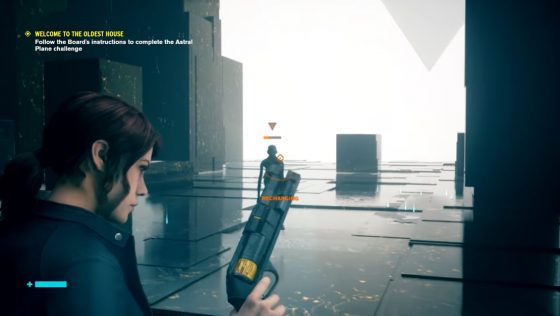
One place where I wish Control would beef things up is enemy variety. There are around eight or nine normal enemies, and you'll really run into the same two or three in many areas. There are some intriguing bosses, but they're tied to missions outside of the main campaign, meaning if you just roll credits, you might miss them. I also wish there was a little more guidance in terms of mission objectives. There were a number of missions where I simply wandered around the appointed area until I randomly ran into the thing I was looking for. Remedy could fix this issue by using the ancillary reading material. Jesse collects a ton of reports and research documents that fill out the world of Control, and some of this should be used to help point players in the direction of their objectives.
I tend to roll from game to game, given the constraints of my job. Control is one of the rare games were even after I finished the critical path, I wanted to keep playing and exploring. Even with the rush of having to start over because of hardware issues, I finished every single mission available in Control, and I'm excited for the DLC. Is it the tightest combat experience, or full of the most amazing writing? Not really. But I found myself vibing with the aesthetics and unique situations Remedy was throwing in my direction. I liked Max Payne and Alan Wake, but I honestly didn't want Control to end. And to me, that's the sign of a great game.
Control continues the basic formula that Remedy Entertainment has been playing with for all these years-third-person action with a hint of unreality-but it feels like the studio has reached its final form. The Oldest House, a vast structure of brutalist architecture and collection of powerful paranormal objects, allows Remedy to play with new ideas and variations on traditional gameplay, breaking up the shooting and superhuman powers with games of red light/green light and journeys through Alice in Wonderland-style mazes. The dialog is still odd, and the mission structure can be obtuse at times, but Control is great. With the Oldest House and Federal Bureau of Control at its back, Remedy Entertainment has fully realized a place where all its game development quirks finally fit.


 2nd September 2019
2nd September 2019